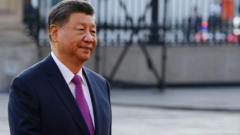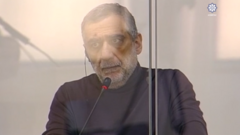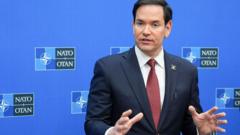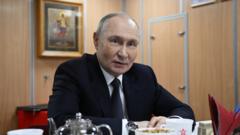Hundreds of thousands of Russians have left their homeland since the Ukraine invasion, driven by fears of conscription and governmental repression. Although peace talks are ongoing, many exiles remain skeptical, believing that a resolution will not change the political climate back home.
Russian Exiles Skeptical About Returning Home Even with Possible Peace Deal

Russian Exiles Skeptical About Returning Home Even with Possible Peace Deal
Citizens who fled Russia amid war fears doubt that peace negotiations will improve their situation or enable their return.
In Istanbul, a popular area for Russian exiles, residents express deep concern about returning to Russia even if a truce is reached. Many, like Pavel Snop, a St. Petersburg real estate agent who relocated three years ago, feel that the war will only end with the fall of President Vladimir Putin. Snop, along with others, fears that negotiations are less about peace and more about securing sanctions relief for Putin and his regime.
This sentiment is fueled by the absence of concrete changes in Russia that would encourage their return. The issue is politically delicate for the Kremlin, as the departure of approximately 800,000 Russians since the conflict began highlights widespread dissent and a loss of essential talent within the country's workforce. The experts warn that this brain drain is detrimental to the economy, as many of those who fled were well-educated professionals in high-demand sectors.
Despite efforts to broker a ceasefire, with even influential figures like President Trump expressing trust in Putin, exiled Russians remain apprehensive about the potential for meaningful change back home. As the dialogue fades amid stalled negotiations, many worry they are stuck in a state of limbo, unable to return to their homeland or see a resolution to the conflict.
This sentiment is fueled by the absence of concrete changes in Russia that would encourage their return. The issue is politically delicate for the Kremlin, as the departure of approximately 800,000 Russians since the conflict began highlights widespread dissent and a loss of essential talent within the country's workforce. The experts warn that this brain drain is detrimental to the economy, as many of those who fled were well-educated professionals in high-demand sectors.
Despite efforts to broker a ceasefire, with even influential figures like President Trump expressing trust in Putin, exiled Russians remain apprehensive about the potential for meaningful change back home. As the dialogue fades amid stalled negotiations, many worry they are stuck in a state of limbo, unable to return to their homeland or see a resolution to the conflict.





















